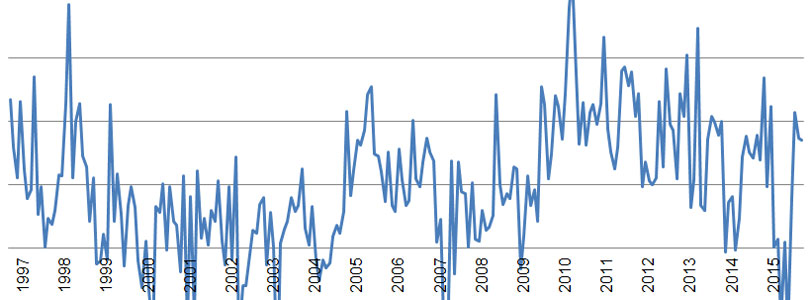Whitehouse Soldiers on Against Freedom of Speech
Despite its making him the face of radical extremism in government, Rhode Island’s junior U.S. Senator, Sheldon Whitehouse, is continuing his push to have his political opponents investigated and prosecuted on the issue of “climate change”:
Protected free speech has boundaries, and one boundary is fraud. The test of whether the denial campaign amounts to fraud is the test established by the Founding Fathers: a case, in a neutral court of law, where the truth can be tested with evidence, under oath and by cross-examination.
Under this standard, there could be no confidence in free speech and public debate in the United States. Government activists (like the police-state thugs who targeted their political opposition with pre-dawn home raids in Wisconsin) could target anybody whom they can claim derives some personal benefit from a political position and subject them to investigation (including the collection of private information for the political use of corrupt government officials) on the grounds that their political advocacy could be considered “fraud.”
His advocacy is proof enough that Whitehouse is a dangerous legislator, but his mendacity compounds the charge. Consider:
The federal judge’s decision in the tobacco case declared that the “[d]efendants knew there was a consensus in the scientific community that smoking caused lung cancer and other diseases. Despite that fact, they publicly insisted that there was a scientific controversy and disputed scientific findings linking smoking and disease knowing their assertions were false.”
The senator presents that quotation as if it should constitute some sort of test by which the hammer of government can come down on individuals and organizations, but he’s being highly deceptive. That line is one point from around forty specific pieces of evidence that “Defendants’ Internal Documents and Research from the 1960s, 1970s, and Beyond Reveal Their Continued Recognition That Smoking Causes Serious Adverse Health Effects and Their Fear of the Impact of Such Knowledge on Litigation.” Yet, Whitehouse blithely leaps from a case in which companies were clearly lying to their customers about the direct adverse consequences of their products to the proposition that industries under fire for broad, political, and still hypothetical accusations of the global effects of their industry should be brought under the government’s heel.
As evidence, Whitehouse cites “investigative reporting” that shows Exxon had heard from researchers about the possibility of carbon emissions and global warming as far back as the 1970s, but “chose to sow public doubt of the emerging scientific consensus.” The senator doesn’t bother to cite his source, but he might mean this report from the not-quite-objective InsideClimate News.
A fair reading even of that incendiary report makes clear how large the gap is between climate science and research about the medical effects of smoking. On a landscape in which there remain questions about the distribution of carbon in the environment, the magnitude of its influence on the various aspects of the climate across the planet, and the net negative and positive effects of the change, it’s hardly a cover up to push back against activists who are attempting to use science to take over industries, subsidize opposing special interests and businesses, and rework the very nature of our political and economic system.
Next Whitehouse gets more specific, and a little research shows his example to be illustrative of climate-change alarmists’ methods. He cites data from the tide gauge at the Naval Station in Newport, which (he says) “shows around 10 inches of sea level rise since the Hurricane of 1938.” Whitehouse has to pick his dates carefully, here. Yes, from September 1938 to July or August 2015, the increase in the tide level rounds to 10 inches, but in March or May, it would have rounded to four inches. If the hurricane had hit a month later, he’d have to subtract another 2.4 inches from the increase. NOAA’s chart of the Newport tides puts the long-term trend, from 1930 to now, at an increase of 2.74 millimeters (or 0.1 inches) per year.
But putting it that way might not inspire people to undermine the First Amendment. Neither would looking at the tides’ more-recent history:
Obviously, referring back to NOAA’s original chart, picking these dates is selective, and even the trendline for this chart would show an increase, because the decade from 2000 to 2010 was generally lower than the half-decade from 2010 to 2015. The point is that it would hardly be unreasonable to see this chart, in combination with a corresponding pause in global warming, as evidence that there is actually a debate to be had.
The debate is particularly relevant in light of another major difference between smoking and climate change. With smoking, companies were measuring their own bottom lines against the health of their customers, who derived no discernible benefit from use of the product other than maybe a learned enjoyment (coupled with addiction). With fossil fuels, the balance is between relatively inexpensive energy to power the global economy for the foreseeable future versus speculative predictions of doom at some point in the distant future, which could be completely reversed by changes in the planet, technology, or the solar system.
Short circuiting that debate in favor of Sheldon Whitehouse’s political allies isn’t worth further undermining our rights to free speech and public debate, and nobody who believes differently should be permitted anywhere near the halls of power in this country.



